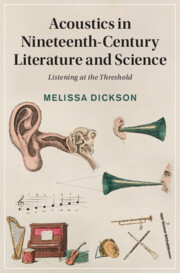Book contents
- Acoustics in Nineteenth-Century Literature and Science
- Cambridge studies in nineteenth-century Literature and culture
- Acoustics in Nineteenth-Century Literature and Science: Listening at the Threshold
- Copyright page
- Contents
- Figures
- Acknowledgements
- Introduction Whispers in the Roar
- Part I
- Part II
- Chapter 4 At the Limits of Audibility
- Chapter 5 Animal Music
- Part III
- Part IV
- Conclusion
- Notes
- Select Bibliography
- Index
- Cambridge studies in nineteenth-century Literature and culture
Chapter 4 - At the Limits of Audibility
from Part II
Published online by Cambridge University Press: 13 December 2024
- Acoustics in Nineteenth-Century Literature and Science
- Cambridge studies in nineteenth-century Literature and culture
- Acoustics in Nineteenth-Century Literature and Science: Listening at the Threshold
- Copyright page
- Contents
- Figures
- Acknowledgements
- Introduction Whispers in the Roar
- Part I
- Part II
- Chapter 4 At the Limits of Audibility
- Chapter 5 Animal Music
- Part III
- Part IV
- Conclusion
- Notes
- Select Bibliography
- Index
- Cambridge studies in nineteenth-century Literature and culture
Summary
Chapter 4 focuses on moments of scientific and imaginative engagement with the question of what lay beyond the limits of human audibility. It begins by considering writings by Charles Babbage, George Eliot, Charles Dickens, and Florence McLandburgh, each of whom explored the possibilities of accessing the continuing sounds of ordinary life beyond the physiological boundaries of human hearing, and the potential artistic, philosophical, and spiritual truths that might be gleaned from so doing. Conversely, the second part of this chapter looks to representations of the limits of individual auditory perception as a newly recognised weakness or vulnerability in the modern subject. The gothic monsters and sensationalised beings of Robert Louis Stevenson, Bram Stoker, and Wilkie Collins, were, I argue, born in part of a paranoid white imperialist mindset, for whom superior auditory perception in others might pose a distinct threat to British social and cultural structures.
Keywords
- Type
- Chapter
- Information
- Acoustics in Nineteenth-Century Literature and ScienceListening at the Threshold, pp. 79 - 104Publisher: Cambridge University PressPrint publication year: 2024

